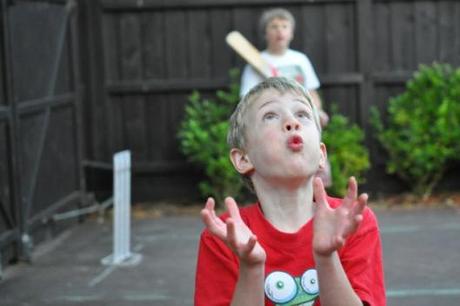I am delighted to introduce Christie Wilkin today through this excellent guest post. I loved interacting with her through comments and emails, getting to know more of her life living thousands of miles away from where she claims citizenship. For those of you who are raising kids between worlds, this post gets to the heart of what so many parents have experienced as they work toward helping their kids understand more about who they are; more importantly whose they are. You can read more about Christie at the end of the essay.
****************

‘Mummy,’ I heard my six-year-old son call as he entered the kitchen. ‘I’m not American anymore! I’m Australian!’ My eyes met those of my Canadian-born husband. ‘Where did this come from?’ we asked each other. ‘How should we respond?’
Our other three children joined us at the table, and as dinner progressed, it became clear that James was tired of being asked about his American accent on the school playground. Two and a half years of living in Melbourne had erased all but the faintest traces of it as far as I could tell. He was not satisfied however. He wanted to be exactly like his Aussie schoolmates.
When my husband and I made the decision to move our family of six from Pittsburgh, Pennsylvania to Melbourne four years ago, it never occurred to us that our biggest dilemma would ultimately prove to be moving them all back home again. Understandably we focused on the trauma of uprooting them from their native soil, away from their grandparents, cousins, aunts, uncles and friends. We spent considerable time weighing up the difficulties inherent in helping four children settle into a completely new life in a foreign country. We must have assumed that if we could make the transition to Melbourne successfully, we would have put the difficult aspects of an international relocation behind us. How wrong we were.
We have since discovered that changing countries means something very different for children than it does for their parents[1]. Adults who have grown up in their passport country are able to move overseas with fully intact national identities. They are able to live on foreign soil and appreciate its differences while not having to wrestle with the question of identity in the same way that children must. Children are still answering the important question “Who am I?” Children also have less capacity for feeling at home in two different places. Most prefer to see the world in black and white. They prefer to think, for example, “I’m either Australian, or I’m American. I can’t be part of both.” This was the dilemma facing our son. His six-year-old self concluded that he was weary of straddling the divide. If he had to choose, he would rather be Australian.
We decided to downplay our son’s assertion of an identity change at the dinner table that night. We told him it was fine for him to be Australian, and for the moment he was satisfied. Many months and many conversations later, he has realized that changing his nationality is not so easy. Today he will tell you that he is an American who would prefer to live in Australia the rest of his life, but that he must move back to North America in order to be closer to family.
As his parents, we recognize that his transition back to Pittsburgh next year will likely have its difficult moments, as it will for his older siblings. The majority of his remembered life experiences have been formed on Australian soil. He is passionate about Australian Rules Footy, loves to watch the cricket, and to eat meat pies with sauce. He can make change with Australian coins, but does not know the difference between a dime and a quarter. He is used to addressing adults by their first names, wears a jumper to school every day, and thinks that Christmas should be spent at the beach in his singlet, shorts and thongs (i.e. flip flops). Pittsburgh culture will no doubt come as a shock to him in spite of the fact that he was born there.
We are thrilled that our children have had so many unique experiences during the three and a half years they have been privileged to live in Melbourne. We wanted them to be changed by living on the other side of the world, and indeed they have been changed. At the same time we now recognize that we unwittingly tampered with the formation of their identities. They will never feel quite the same as their American counterparts who haven’t spent time living overseas. Part of their hearts and lives will be left behind in Australia, and this could well be a source of grief for them for some time.
So what is a family to do who has asked this of their children? This question has given us much to think about. For starters, we have had many conversations with our kids about their identity. They need to know first and foremost that their parents love them fully and without condition and that we always will. Indeed, we have sensed a growing bond in our family as together we face the prospect of moving back home. More importantly, we have reminded them as Christians, our true identity is to be found in Jesus. We are Christians before we are Canadians, Americans or Australians. What a blessing it is that our faith transcends national, ethnic and cultural boundaries. The fact that many of our dearest Australian friends are Christians as well means that our good-byes, painful as they may be, will not be forever. We have the hope of seeing them again.
We have also done as much as we can to foster ties with grandparents, aunts, uncles and cousins back in North America. Our children are fortunate to have many family members who will welcome them back home with open arms. We have made plans for them to attend the same summer camp they enjoyed before we moved away, and we have discussed exactly whom we will visit and when during our first few months back on American soil.
Still there is likely to be grief and bewilderment ahead for our children that we did not fully anticipate. We would prefer to shield them from pain, but since this is not fully possible, we will grieve along with them, assure them that there are others who know how they feel, and seek to help them as much as we can to reintegrate into their passport culture.
What about you? How have you helped your children reintegrate into their passport culture? If any readers of this post have other suggestions, I would love to hear them.

[1] Pollock, David C. with Ruth E. Van Reken, Third Culture Kids: Growing Up Among Worlds, Revised Edition,


